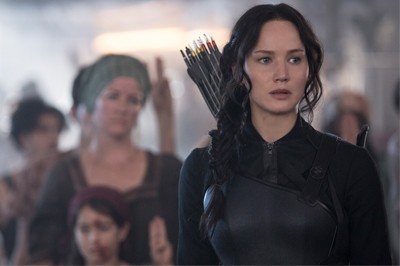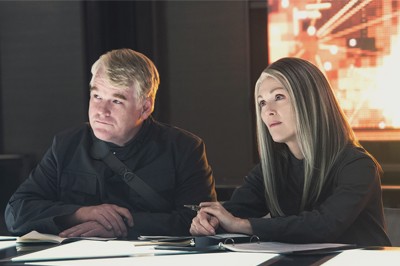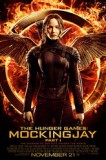| Reviews & Columns |
|
Reviews DVD TV on DVD Blu-ray 4K UHD International DVDs In Theaters Reviews by Studio Video Games Features Collector Series DVDs Easter Egg Database Interviews DVD Talk Radio Feature Articles Columns Anime Talk DVD Savant Horror DVDs The M.O.D. Squad Art House HD Talk Silent DVD
|
DVD Talk Forum |
|
|
| Resources |
|
DVD Price Search Customer Service #'s RCE Info Links |
|
Columns
|
|
|
Hunger Games: Mockingjay - Part I, The
Lionsgate Home Entertainment // PG-13 // November 21, 2014
List Price: Unknown [Buy now and save at Fandango]

The YA (young adult) book-to-screen adaptations have certainly had their highs and lows over the past few years. It's incredibly difficult for any such series to come close to competing with the likes of the Harry Potter franchise, although some have managed to come close. Suzanne Collins' books have certainly ushered in a new generation of readers. While not necessarily on the same level, it has proven to be a power to reckon with. The first entry in the film franchise is quite strong, and the sequel Catching Fire is a surprising improvement. Now that the concept of splitting the final entry into two films has become popular in these YA adaptations, it should come as no shock that The Hunger Games would be doing the same thing. The question is, does it actually benefit the story to have been cut in half?
Following Katniss Everdeen's (Jennifer Lawrence) second experience in the games, she's forced into hiding along with the remaining citizens of the district that she once called home. When she's introduced to President Coin (Julianne Moore), she's convinced to become the face and symbol of the rebellion against the all-power Capitol. Little does she realize, that fellow survivor Peeta Mellark (Josh Hutcherson) is still alive, but has been captured by the enemy. Utilized as the Capitol's weapon in the same way that Katniss is being used by the districts, she must find a way to save him and convince the remainder of the districts to rise and fight alongside her.
Still in a state of shock, President Coin's words of rebellion don't reach Katniss. She has a sense of guilt that runs through her, as she feels as if she abandoned Peeta in the games. It isn't until associate Plutarch Heavensbee (Philip Seymour Hoffman) recommends that she sees what is left of the district that she once called home. It is now a place filled with nothing but rubble and the remains of those who didn't escape in time. Filled with a hunger for retribution, Katniss agrees to become the face of the rebellion against everything that the Capitol stands for. Her true desire is literally spelled out amongst the rubble, as the word "Justice" can clearly be seen. Katniss doesn't want all of those deaths to be for nothing, and feels that she must do something about it. After witnessing the conditions that these people were forced to live under in The Hunger Games and Catching Fire, it's clear that the story had always been building up to this need for justice in an unjust future. While we see very little from the enemy's perspective, we are treated to a scene that perfectly sets up what is to come, as President Snow (Donald Sutherland) is receiving a close shave and gets nicked. He makes a comment about not ever allowing anybody to see them bleed, displaying the relentless nature of the Capitol.
If you're seeing The Hunger Games: Mockingjay - Part I for the action, you'll be disappointed to see a severe lack of it. Since the first two entries took place within the games, audiences were treated to plenty of intense survival sequences. However, this is primarily about the politics of a rebellion finally taking form, so there aren't many action scenes to speak of. This is all clearly being held for the final part of the series. Unfortunately, a large majority of the film is dedicated to a whole lot of whining from Katniss' perspective. This precious time is taken up by her crying and leaning on Gale Hawthorne's (Liam Hemsworth) shoulder. This heavily contrasts the "girl on fire" that we have come to know and love in the two previous pictures. Rather than feeling human, she often come off as being overly-dramatic, especially when it comes to Peeta. This ultimately hinders any emotional impact, as many of the character traits somehow begin to change. Fortunately, the comedic relief found in Effie Trinket (Elizabeth Banks) proves to be one of the film's saving graces. Peter Craig and Danny Strong's screenplay manages to deliver some genuine laughs that feel natural to the picture, as Effie struggles to adjust to a new lifestyle without all of the crazy make-up, wigs, and dresses. If nothing else, Craig and Strong have a firm understanding of tone, and how to gradually shift it without it ever feeling jarring or out of place.
However, all of the success that Craig and Strong make with their tonal shifts is hindered, as they take a few steps back when it comes to their faith in the audience. The film constantly feels the need to remind us what happened over the past two features, which becomes incredibly frustrating. If we're sitting in the cinema for The Hunger Games: Mockingjay - Part I, then chances are, we've seen the previous entries, and understand the language of the society. This constant need to reexplain elements that we're already aware of is downright insulting. The idea to focus more heavily on the characters right before the rebellion is about to break out isn't a bad one, but the execution is what disappoints. We're treated to hints of it through supporting characters, such as Gale, as he briefly describes the immense guilt that he feels for not trying to save more people within the district. However, this begins and ends at this single point, as the screenplay fails to further explore the emotions of these characters. Instead, we're constantly being told about Katniss' feelings about Peeta's capture, which gets stale really quickly. Who was once a strong female character has become a whiny role that has become tremendously difficult to connect with.
Perhaps one of the film's more intriguing aspects is its look at propaganda. This is a term that has been used according to a variety of different messages. Originally, The Hunger Games was a piece of social commentary on our morbid curiosity of violence in the media, posing as entertainment. Now that the games have passed, the story has slightly changed gears. The picture takes on a slightly comedic look at the staging of a propaganda commercial before shifting to a much more serious tone. Some of the more fiery scenes to be found in The Hunger Games: Mockingjay - Part I can be found within the passionate speeches given by Katniss, as she utilizes the media in order to emotionally manipulate viewers in the districts to take action against the system. She compares the spreading of fire to the Capitol's belief that burning the districts won't cause this unjust society to ignite themselves. The film does an excellent job communicating many internal struggles through the use of these propaganda commercials.
The feature's star power is a great marketing tool here, as Jennifer Lawrence owns the role of Katniss Everdeen. For the most part, this is a powerful performance that works rather well. A few elements of the portrayal can feel a bit over-the-top, but it's difficult to tell for certain whether it's the content or the actress. When she's giving one of the big propaganda speeches, this proves to be a portrayal well-worth the price of admission, as audiences are sure to become a bit riled up. Josh Hutcherson is fine here as Peeta Mellark, although he isn't given nearly as much to do as he was in previous entries. Liam Hemsworth has a moment in the spotlight as Gale Hawthorne, and he most certainly owns the scene. It's a shame that we aren't exposed to more of these sequences. Supporting performances by Donald Sutherland, Philip Seymour Hoffman, Julianne Moore, and Elizabeth Banks are all spot on. They add another dimension to the film, making it an immersive experience that we feel like we're a part of.
Director Francis Lawrence successfully made Catching Fire visually appealing, and he has done it once again in this follow-up. The Hunger Games: Mockingjay - Part I has flair that truly adds to the atmosphere. A large amount of the film takes place in a drab underground base, but when we occasionally make the trip above ground, the color palette becomes a vibrant display of bright colors. There are numerous smart pieces of visual symbolism here, but it's a shame that such a large amount of it is then directly stated in the dialogue. Regardless, the film is supported by a solid visual presentation, and a very capable soundtrack. The small amount of action that takes place in this film looks great. Now, if only there was more of it.
This is a perfect example of a final entry that didn't need to be separated into two films. In fact, it had the potential to be much more impactful as a single feature. The first part of this finale has a lot of repetitive material that takes joy in telling, rather than showing. The emotional connection that we have established through the first two entries is absent here. Even so, the districts and the Capitol still prove to be a part of a greater world that we're glad to immerse ourselves in, as it remains to have its social commentary on our obsession with sensationalism. Peter Craig and Danny Strong's screenplay is a bit too "on-the-nose," although there are some genius bits of material here. You just have to dig through a lot of the "fluff" in order to get to the real meat of it all. The Hunger Games: Mockingjay - Part I hints at a more balanced second half, but part one is practically starved of the impact that this franchise is famous for. Rent it.

|
| Popular Reviews |
| Sponsored Links |
|
|
| Sponsored Links |
|
|
| Release List | Reviews | Shop | Newsletter | Forum | DVD Giveaways | Blu-Ray | Advertise |
|
Copyright 2024 DVDTalk.com All Rights Reserved. Legal Info, Privacy Policy, Terms of Use,
Manage Preferences,
Your Privacy Choices | |||||||











